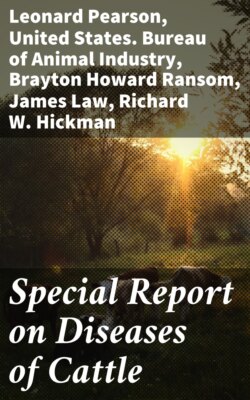Читать книгу Special Report on Diseases of Cattle - Lowe - Страница 133
На сайте Литреса книга снята с продажи.
PLEURISY.
ОглавлениеPleurisy is an inflammation of the serous membrane lining the chest cavity and enveloping the lungs. It is somewhat rare as an independent disease, but it often complicates pneumonia; indeed, it is often caused by the same germ that causes pneumonia—pneumococcus. It may arise from exposure to cold or wet or from external violence, and is usually present in some degree in cases in which the ribs have been fractured with or without a penetrated wound.
Symptoms.—In the first stage there is great pain aggravated by movement, and the animal is usually stiff as though foundered, the pulse is quick and hard, the breathing abdominal, the chest being fixed so far as possible, the inspiration short and jerky, the expiration longer. The pain is caused by the friction of the dry, inflamed pleural surfaces of the lung and chest on each other. At this stage the ear detects a dry friction murmur, resembling somewhat the sound made by rubbing two pieces of sole leather together. Pres sure between the ribs gives pain and usually causes the animal to flinch and grunt. The muzzle is hot and dry, the mouth slimy, and the secretions scanty. After a day or two the severity of the symptoms is much lessened, the temperature, which during the first days may have been as high as 106° F., falls to 103° or 104°, the pain decreases, the stiffness disappears, and the patient eats a little. The pulse softens, but remains quicker than normal. Now, day by day the patient loses a little strength, the friction sound disappears as the exudation moistens the pleural surfaces; percussion now shows a horizontal line of dullness, which day by day rises higher in the chest, the respiration grows more frequent and labored, the countenance is anxious and haggard, the eyes sink somewhat in their sockets, and in unfavorable cases death occurs during the second or third week, from either asphyxia or heart failure.
In pleurisy, as in pneumonia, the elbows are usually turned outward. Care must be taken to differentiate pleurisy from traumatic pericarditis (which see). In the latter condition the area of dullness of the heart is much increased, and usually a splashing sound is heard at each beat of the heart. Another diagnostic symptom of value is that in traumatic pericarditis respiration is painful, not difficult, and the respiratory rate is very much increased on movement. In both conditions a considerable swelling of the dewlap may be noticed in the later stages.
Treatment.—Give the same general care as recommended in bronchitis or pneumonia. In the early stages give a febrifuge to reduce the fever, as directed for pneumonia. For relief of the cough give electuary formula, which will be found in the treatment of laryngitis. The bowels must be kept relaxed and the kidneys secreting freely. In the stage of effusion the following should be given three times daily: Digitalis tincture, 1 ounce; iodid of potassium, 30 to 60 grains; mix. Apply strong counterirritant to chest and put seton in dewlap. (See "Setoning," p. 293.) If collapse of the lung is threatened, a surgical operation, termed paracentesis thoracis, is sometimes performed; this consists in puncturing the chest cavity and drawing off a part of the fluid. The instruments used are a small trocar and cannula, which are introduced between the eighth and ninth ribs. The skin should be drawn forward so that the external wound may not correspond to the puncture of the chest, to prevent the entrance of air. Only a portion of the fluid should be removed. The animal gets immediate relief, but it is generally only temporary, as the fluid has a tendency to accumulate again.
